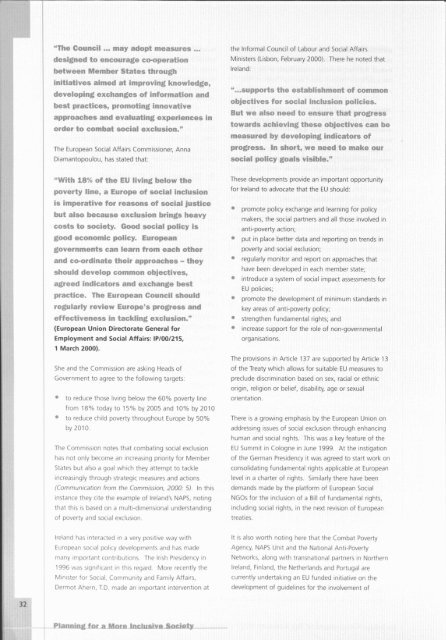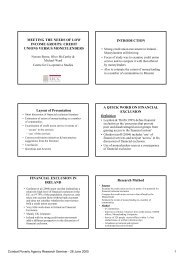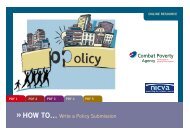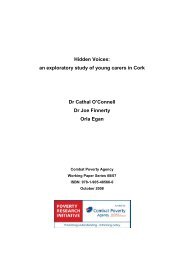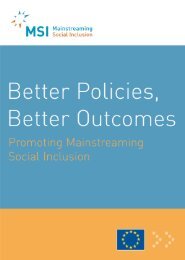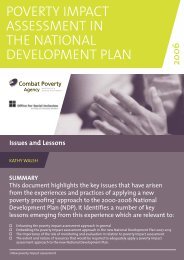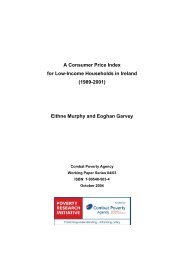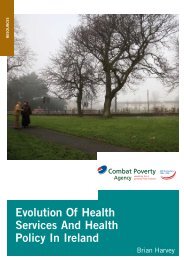Planning for a More Inclusive Society - Combat Poverty Agency
Planning for a More Inclusive Society - Combat Poverty Agency
Planning for a More Inclusive Society - Combat Poverty Agency
Create successful ePaper yourself
Turn your PDF publications into a flip-book with our unique Google optimized e-Paper software.
1"The Council ... may adopt measures ... the In<strong>for</strong>mal Counc~l of Labour and Soc~al Affatrsdesigned to encourage co-oaerationM~n~sters (L~sbon, February 2000) There he noted thatbetween Member States throuh Ireland./ initiatives aimed at improvintz knowledge. . ,"...SLID~O~~S the establishment of commondeveloping exchanges of in<strong>for</strong>mation andobiectives <strong>for</strong> social inclusion policies.best practices, promoting innovativeRut we also need to ensure that progress/ approaches and evaluating! .* exoeriences . intowards achieving these obiectives can beorder to combat social exclusion."measured by developing indicators ofThe European Soc~al Affa~rs Comm~ss~oner, AnnaD~amantopoulou, has stated that"With 18% of the EU living below thepoverty line, a Europe ofis imperative <strong>for</strong> reasons of social justicebut also because exclusion brings heavycosts to society. Good social policy isgood economic policy. Europeangovernments can learn from each otherand ca-ordinate their approaches - theyI should develop common objectives,/ agreed indicators and exchange bestI practice. The European Council shouldregularly review Europe's progress andeffectiveness in tackling exclusion."1(European Union Directorate General <strong>for</strong>Employment and Social Affairs: IP1001215,1 March 2000).She and the Commlss~on are asklng Heads ofGovernment to agree to the following targetsto reduce those living below the 60% poverty linefrom 18% today to 15% by 2005 and 10% by 2010to reduce child poverty throughout Europe by 50%by 2010.The Comm~ss~on notes that combattng soc~al exclus~onhas not only become an tncreaslng prlor~ty <strong>for</strong> MemberStates but also a goal whlch they attempt to tackletncreaslnqly through strategic measures and actlons(Cornmun~catron from the Cornrnaslon, 2000 5) In th~sInstance they c~te the example of Ireland's NAPS, notlngthat th~s IS based on a multi-d~mens~onal understandtnqof poverty and soclal exclus~onprogress. In short, we need to make oursocial policy goals visible."These developments provide an important opportunity<strong>for</strong> Ireland to advocate that the EU should:promote policy exchange and learning <strong>for</strong> policymakers, the social partners and all those involved inanti-poverty action;put in place better data and reporting on trends inpoverty and social exclusion;regularly monitor and report on approaches thathave been developed in each member state;introduce a system of social impact assessments <strong>for</strong>EU policies;promote the development of minimum standards inkey areas of anti-poverty policy;strengthen fundamental rights; andincrease support <strong>for</strong> the role of non-governmentalorganisationsThe provisions in Article 137 are supported by Article 13of the Treaty which allows <strong>for</strong> suitable EU measures topreclude discrimination based on sex, racial or ethnicorigin, religion or belief, disability, age or sexualorientation.There is a growing emphasis by the European Union onaddressing issues of social exclusion through enhancinghuman and social rights. This was a key feature of theEU Summit in Cologne in June 1999. At the instigationof the German Presidency it was agreed to start work onconsolidating fundamental rights applicable at Europeanlevel tn a charter of rights. Similarly there have beendemands made by the plat<strong>for</strong>m of European Soc~alNGOs <strong>for</strong> the inclusion of a Bill of fundamental rights,including social rights, in the next revision of Europeantreaties.excluded persons and the organisations which representthem in the development, implementation andevaluation of social inclusion and anti-poverty strategies.4 Concclrarrs~sanThe changing economic and social context is altering thenature of poverty in Ireland. Recent years have seenmassive reductions in unemployment and a substantialdecline in consistent poverty. However, incomeinequalities are increasing and some groups continue tohave a high risk of poverty. This changing context needsto be understood and the implications of it addressedthrough appropriate social policies. The resources arenow available largely to eliminate poverty. It isimportant that this opportunity is taken.The UN provided the stimulus <strong>for</strong> the initial developmentof NAPS. Copenhagen +5 in June 2000 will provide anopportunity to build on and develop the original NAPS.A key feature here should be the inclusion of a strongerrights focus in the Strategy.Europe is playing an increasingly significant role oftackling poverty and social exclusion. lreland can takeIrclcand has ~ntcr~lctecia very posltlve way wlth It 1s also worth notlnq here that the <strong>Combat</strong> <strong>Poverty</strong>European social pol~cy developments and has madeAqency, NAPS Un~t and the Nattonal Anti-<strong>Poverty</strong>mdny important tontr~buttons The lrlsh Pres~dencv 111 Networks, along wlth transnat~onal partners In Northern1996 ~vas vqn~flcant In thts reqard <strong>More</strong> recently theMtn~ster <strong>for</strong> Social, Cornrnun~ty and Famlly Affa~rs,Dermot Ahern. TD made an ~mportant ~ntervent~on atIreland, Flnland, the Netherlands and Portugal arecurrently undertaking an EU funded lnlttattve on thedevelopment of gu~deltnes <strong>for</strong> the involvement ofP1anninE <strong>for</strong> a <strong>More</strong> Incfatsive <strong>Society</strong>- An 1n;)iat Assessment of the National Anti-Davertv StrateE~ pad 2


